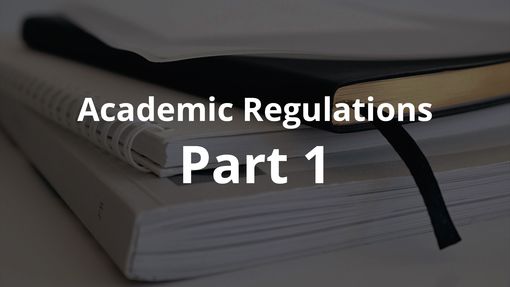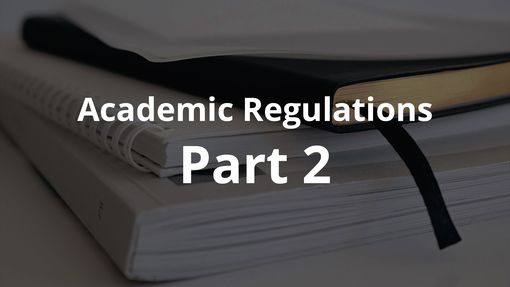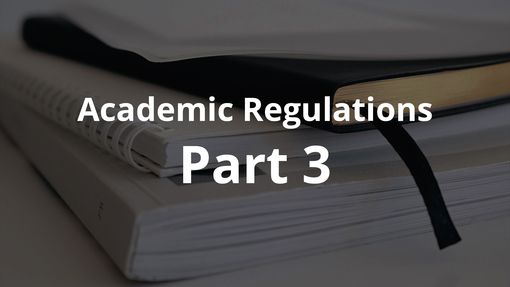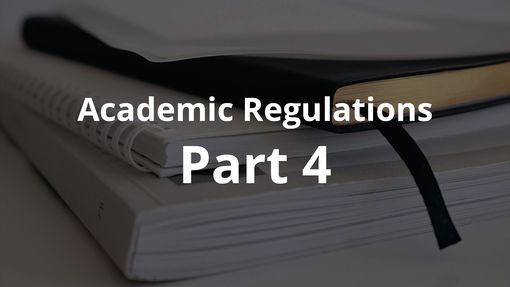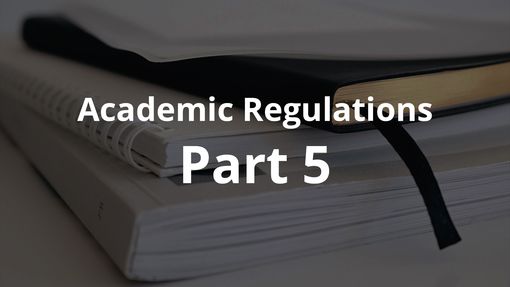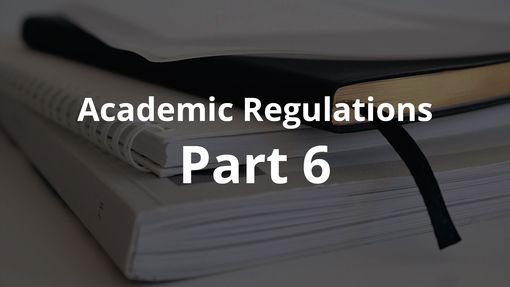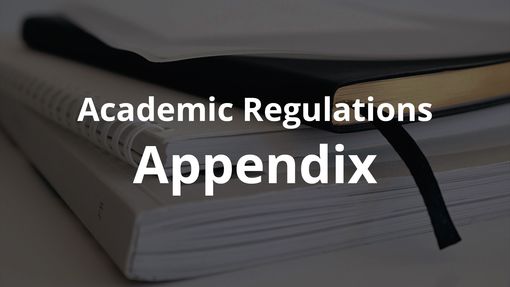Academic Regulations Appendix: Additional Regulations in the Event of Significant Disruptions
Contents
1. Marking and Internal Moderation
General Principles
The following regulations take precedence over other regulations relating to assessment, academic progression, the conferment of awards, and the terms of reference, membership and quoracy of Examination Boards18 in the event that the academic business of Central is significantly disrupted: for example, because of pandemic, quarantine or widespread illness, an actual, suspected or threatened act of terrorism, or a national emergency.
Central’s appeals and complaints procedures will remain in force during such periods of disruption, although the timings specified therein may be subject to amendment or alteration. Any necessary changes to timings will be communicated to the individual students involved.
Any impacted assessment deadlines will normally be adjusted for all students during periods of disruption, and will be communicated via the usual channels (that is, by the Programmes Office); requests for further extensions, related to individual circumstances, and for additional time should continue to be submitted in the normal way (via the appropriate Unit Tutor or Programmes Officer). Students should not normally be required to submit a claim for mitigating circumstances in respect of the disruption, as this will be taken into account at Examination Board. However, specific individual circumstances which affect students’ studies should be reported via the mitigating circumstances procedure in the usual way.
These regulations will only be enacted if formally invoked by the Principal on behalf of the Academic Board. This action will be reported to the following meeting of the Academic Board.
A guiding principle behind these regulations is to retain a rigorous, fair and criteria-based approach to assessment and the award of academic credit, while also seeking to minimise the detrimental effects of external disruptions. The overriding objective is for no student to be adversely affected in terms of progression or award outcomes by the particular circumstances that have necessitated the enactment of these regulations.
18 Specifically Part 4 (Assessment and Progression) and Part 5 (The Conferment of Awards). See also Section 5 (Quality Assurance and Good Practice in Assessment), Section 6 (External Examiners), and Section 7 (Examination Boards) of the Handbook of Quality Assurance and Enhancement.
1. Marking and internal moderation
1.1 Significant disruption to the activities and business of the School may interfere with the marking and moderation of assessments: for example, if staff are not available to mark work, or if students are not able to engage with assessments.
1.2 In circumstances where students have been able to submit work for assessment but it has not been possible to mark and/or moderate it in time for Examination Board, the Board will agree provisional outcomes before reconvening at a later date to confirm final outcomes (once it has been possible to mark and moderate work in accordance with the School’s standard procedures.) Alternatively, the Board may agree that Chair’s action can be taken to confirm final outcomes.
1.3 In circumstances where it has not been possible to set or submit work for assessment, the Examination Board may take any of the decisions open to it based on the assessment results that are available. See Section 2, below, for more information.
1.4 The School will exceptionally permit single marked results for assessments for which double marking is required, and will also exceptionally allow results that have not been internally moderated. In these circumstances, and providing External Examiner sampling has taken place, the outcomes agreed by the Examination Board can be considered final. Where External Examiner sampling has not taken place, the Board will normally agree provisional outcomes before reconvening at a later date to confirm final outcomes (once said moderation has occurred.) If External Examiner sampling is not at all possible because of the particular nature of the disruption, the Examination Board will agree (through Chair’s action, if necessary) an alternative method of moderation, for example involving academic staff with external examining expertise from other courses within the School.
2. Examination Board
Unit Marks
2.1 There may be circumstances where the Examination Board is unable to receive and confirm the marks for particular units: for example, because it has not been possible for staff to set or mark assessments, or because students have not been able to submit or engage with assessed work, owing to significant disruption to the activities and business of the School. The Board can confirm the overall unit mark based on partial completion of its assessment requirements, provided that:
- a sufficient and appropriate range of learning outcomes have been met through the work that has been assessed and marked;
- at least 50% of the weighted unit assessment is available to the Board.
2.2 If the Board decides that it is unable to agree an overall unit mark (for example, because less than 50% of the weighted unit assessment is available), it will normally confirm final outcomes only once marks have been provided. However, it may still agree to make decisions about progression and final awards and classifications, as follows.
Progression
2.3 In instances of significant disruption, all reasonable efforts will be made to deliver alternative forms of assessment and, where it is deemed appropriate and necessary, alternative course content. Any such alterations will be developed and approved in accordance with the appended policy on Emergency Programme Development and Approval.
2.4 Progression through levels of study is normally only agreed by the Examination Board once students have completed all of the specified assessments and accumulated all of the necessary credit at each level of their degree. However, in instances of significant disruption, the Board may approve progression if students have accumulated at least twothirds of the credits on a level of study (for example, 80 out of a total 120 credits for BA courses), and a sufficient and appropriate range of learning outcomes have been met through the work that has been assessed and marked at that level. In such cases, the ‘missing’ mark(s) (or a Pass/Fail outcome, where appropriate) will be determined by taking a weighted average of the marks for those units at the level of study that have been completed and assessed, disregarding the lowest mark where there are three or more.
2.5 Alternatively, students may be permitted to ‘trail’ credit into the following level of study. This is not normally permitted by the School; however, in instances of significant disruption, the Examination Board may, on a course-by-course basis, permit students to trail totalling up to 40 credits (for undergraduate courses) or 60 credits (for taught postgraduate courses) into the next academic year if at least 80 (undergraduate) or 120 (taught postgraduate) credits have been passed. The Board will require confirmation that it is realistic and in their best interests for students to undertake work/assessments from the previous level alongside that of the following level.
2.6 Where the Board does agree that students can trail credits into the next level of study, unit results will be reviewed once they are made available and students will be offered additional options and support for those they have not passed: indicatively, this might include additional opportunities to resit assessments without academic penalty, or compensation or condonement above the maximum number of credits specified in the Academic Regulations. All such options are subject to the approval of the Board.
Awards
2.7 Final awards are normally only agreed by the Examination Board once students have completed all of the specified assessments and accumulated all of the necessary credit on their degree. However, in instances of significant disruption, the Board may consider final awards and classifications if students have accumulated at least two-thirds of their final level credits (for example, 80 out of a total 120 credits for BA courses; or 120 out of a total of 180 credits for MA courses), and a sufficient and appropriate range of learning outcomes have been met through the work that has been assessed and marked at final level. In such cases, the ‘missing’ mark(s) will be determined by taking a weighted average of the marks for those units at final level that have been completed and assessed, and a final classification calculated accordingly. Alternatively, where work has been submitted but summative assessment has not been possible, the Board might consider proxy marks derived from working journals, notes from personal tutors, or similar.
2.8 Examination Board does not normally make any special consideration of borderline (ie between classifications) cases, except where individual mitigating circumstances have been upheld. When significant disruption has led to these additional Academic Regulations being invoked, however, the Board may agree to give special consideration to all students whose final mark is likely to have been affected by disruptive external circumstances, and is within 5% of a classification threshold (i.e. 4.99% and less to the next-high classification), upon the recommendation of the relevant Course Leader. In such cases, transcripts will record the original mark but note the adjusted classification.
Conduct of the Board, including quoracy
2.9 Detailed records of all decisions taken and the reasons taken – particularly where they deviate from standard practice – must be made in the minutes of the Examination Board.
2.10 If it is not possible for the Examination Board to fulfil the usual requirements for quoracy wholly or partly as a result of significant disruption, the Principal may take action on behalf of the Academic Board to approve a reduced quorum for a given meeting. Every effort should be made, however, to enable members to attend remotely.

